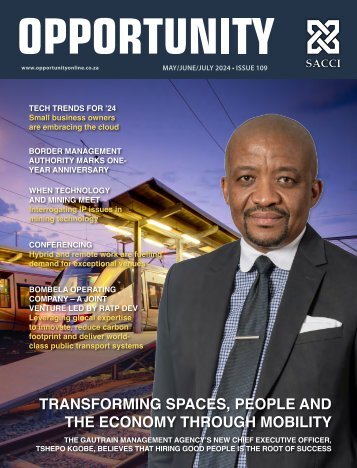South African Business 2016 edition
- Text
- Investment
- Government
- Business
- Development
- Network
- Sectors
- Investing
- Business
- Africa
- African
- Economic
- Manufacturing
- Mining
- Opportunities
- Economy
- Overview
OVERVIEW Regional
OVERVIEW Regional overview: KwaZulu-Natal Golden beaches, tropical palms, sugar plantations as far as the eye can see and a balmy climate almost all year round. That, in a nutshell, is KwaZulu-Natal, South Africa’s “Garden Province”. Growth areas The province has shown considerable growth in the business services, transport and retail sectors. This manufacturing hub makes up almost a third of South Africa’s m Gauteng and KwaZulu-Natal account for 42% of the country’s population with Census 2011 revealing the economic heartland pipped its coastal cousin to the post in claiming the most residents. For the first time, Gauteng is now home to more South Africans than KwaZulu-Natal with 12.3-million people (23.7%) living inland against only 10.3-million people (19.8%) in KwaZulu-Natal. KwaZulu-Natal has made significant strides in implementing the objectives in line with the National Growth and Development Plan. KwaZulu-Natal employment has risen from 2.1-million people in 2010 to 2.4-million currently, despite the sluggish economic environment. It is these statistics that speak to the poverty eradication plan and dove-tail on a microeconomic level with the development initiatives and potential in places like the Makhathini Flats. In July Premier Sezo Mchunu announced the Makhathini Flats would receive a R1.1-billion investment to revamp agriculture and improve agricultural infrastructure. The main focus of the investment would be livestock, irrigation infrastructure and planting various rare crops including ground nuts and cassava. KwaZulu-Natal has also implemented the first stage of Operation Phakisa, the national initiative aimed at unlocking South Africa’s economic potential. Food production Food production makes a mark with companies such as Unilever, Illovo Sugar, Tongaat- Hulett Group, Rainbow Chicken and Clover. Industrial investment plays a substantial role in the provincial economy with two of the country’s busiest ports situated there, Richards Bay and Durban. The international trade success is to some extent dependent on developed transport and logistics infrastructure. Recently, the Dube TradePort has driven economic growth. It is home to the King Shaka International Airport, an agricultural greenhouse, a cargo terminal and various other sections relating to trade, business and transport, all on 3 000 hectares of land just north of Durban. SOUTH AFRICAN BUSINESS 2016 170
KwaZulu-Natal sector contribution. SOURCE: STATS SA GENERAL GOVERNMENT SERVICES 13% PERSONAL SERVICES 6% FINANCE, REAL ESTATE & BUSINESS SERVICES 20% TRANSPORT, STORAGE & COMMUNICATION 14% WHOLESALE, RETAIL, MOTOR TRADE, CATERING & ACCOMMODATION 14% CONSTRUCTION 3% ELECTRICITY, GAS & WATER 2% MANUFACTURING 22% MINING & QUARRYING 2% AGRICULTURE, FORESTRY & FISHING 4% OVERVIEW It has attracted a R2-billion foreign direct investment through Indian business conglomerate Action Group and is making a solid contribution to KwaZulu- Natal’s economy. Economic future The Renewable Energy Development Hub (RED Hub), a partnership between the provincial government, eThekwini Municipality, Ilembe District Municipality and private firms, is leading a renewable energy project. The deal was confirmed in March 2013 and will consist of various components including laboratories, a renewable-energy education and training facility (which will involve Durban University of Technology), as well as a technology hub for research and development. It will also host a manufacturing and technicalservices sector for the renewable-energy industry. Major new projects The R1.5-billion Inkululeko Development Project, piloted within the Ndumo community, is an integrated multi-purpose and multi-sectoral initiative that includes constructing high quality education centres, health services, modern roads and libraries, clean running water, sustainable livelihoods, job creation and community centres for vulnerable children and orphans. In terms of Inkuleleko, unveiled in December 2013, the provincial Department of Education has several projects including rebuilding St Phillips, Maphindela and Thelemama primary schools as well as building an as-yet unnamed new model school. “This is a project developed as part of the commitment to improving the lives of people who live in rural areas,” said Senzo Mchunu, Premier of KwaZulu-Natal today when he launched the province’s master plan to combat prevalent poverty affecting. Mchunu is also passionate about reducing HIV/Aids in the province, clearing the slums and raising the standards of the most vulnerable in society. In that debate was the desire to create 900 000 new jobs by 2020. Mchunu stressed that by assisting the vulnerable it hd enabled government to reduce the “sense of exposure” that such communities felt and, in so doing, had helped precipitate economic growth by encouraging their participation. KWAZULU-NATAL www.kwazulunatal.gov.za Capital Population Area Premier Pietermaritzburg 10 919 100 (2015) 94 361 km 2 Senzo Mchunu (ANC) Languages isiZulu, English 171 SOUTH AFRICAN BUSINESS 2016
- Page 1:
SOUTH AFRICAN BUSINESS 2016 EDITION
- Page 6:
CONTENTS Introduction CONTENTS Sout
- Page 10 and 11:
CREDITS Publisher Chris Whales Publ
- Page 12 and 13:
SPECIAL FEATURE South Africa A peri
- Page 14 and 15:
SPECIAL FEATURE In a year that saw
- Page 16 and 17:
SPECIAL FEATURE owes its existence
- Page 18 and 19:
SPECIAL FEATURE against water losse
- Page 20 and 21:
SPECIAL FEATURE Operation Phakisa h
- Page 22 and 23:
SPECIAL FEATURE late in 2014. The h
- Page 24 and 25:
SPECIAL FEATURE Understanding Afric
- Page 26 and 27:
INTERVIEW Job creation on track Ala
- Page 28 and 29:
SPECIAL FEATURE Business funding Th
- Page 30 and 31:
SPECIAL FEATURE in turn makes it ve
- Page 32 and 33:
SPECIAL FEATURE Contact: 012 394 18
- Page 34 and 35:
SPECIAL FEATURE Black Business Supp
- Page 36 and 37:
SPECIAL FEATURE The evolution of sk
- Page 38:
SPECIAL FEATURE providing TVET lear
- Page 42:
PROFILE FP&M Seta Facilitating and
- Page 45 and 46:
• The development of a national s
- Page 48 and 49:
FOCUS Champions of change Five dyna
- Page 50 and 51:
SPECIAL FEATURE The top law firms S
- Page 52 and 53:
SPECIAL FEATURE Keeping the BRICS t
- Page 54 and 55:
SPECIAL FEATURE Keeping BEPS in che
- Page 56 and 57:
SPECIAL FEATURE IPAP in action In 2
- Page 58 and 59:
FOCUS THERE’S NO END TO THE BENEF
- Page 60 and 61:
INTERVIEW The riches of Africa awai
- Page 62 and 63:
INTERVIEW and it could actually be
- Page 64 and 65:
PROFILE ECIC exco profiles Profiles
- Page 66 and 67:
INTERVIEW The hub of Africa Tim Har
- Page 69 and 70:
Key sectors Overview of the main ec
- Page 71 and 72:
OVERVIEW from the subsistence farme
- Page 73 and 74:
OVERVIEW South Africa produces abou
- Page 75 and 76:
South Africa’s looming energy gap
- Page 77 and 78:
How will these resources be develop
- Page 79 and 80:
Vall exclusive economic zone limits
- Page 82 and 83:
OVERVIEW NEED PIC Mining The South
- Page 84 and 85:
OVERVIEW Mineral beneficiation The
- Page 86 and 87:
PROFILE The Council for Geoscience
- Page 88 and 89:
OVERVIEW Energy The South African e
- Page 90 and 91:
INTERVIEW Cummins South Africa Cumm
- Page 92 and 93:
OVERVIEW Manufacturing Increasing m
- Page 94 and 95:
OVERVIEW Automotive International i
- Page 96 and 97:
OVERVIEW Automotive components Incu
- Page 98 and 99:
OVERVIEW Chemicals and pharmaceutic
- Page 100 and 101:
OVERVIEW Healthcare South Africa’
- Page 102 and 103:
OVERVIEW Water Severe water restric
- Page 104:
OVERVIEW Improving quality The intr
- Page 107 and 108:
Our Vision is is “Quality water f
- Page 109 and 110:
OVERVIEW 107 SOUTH AFRICAN BUSINESS
- Page 111 and 112:
OVERVIEW airports in India and Braz
- Page 113 and 114:
affords, while maintaining its envi
- Page 115 and 116:
kets, except Australia. In Africa,
- Page 117 and 118:
Rosebank, Johannesburg, renamed ‘
- Page 119 and 120:
Trade with Africa Improved infrastr
- Page 121 and 122: FOCUS MTN plugs R1.2-billion into K
- Page 123 and 124: MTN rolls out fibre infrastructure
- Page 125 and 126: OVERVIEW community engagement. The
- Page 127 and 128: PROFILE For BEE Verification and is
- Page 129 and 130: OVERVIEW attracting and retaining c
- Page 131 and 132: OVERVIEW Small business is taken ve
- Page 133 and 134: Franchise Fund—an innovative plat
- Page 135 and 136: educating young people in fields th
- Page 137 and 138: OVERVIEW Management Plan has divert
- Page 139 and 140: hazardous waste is also not being c
- Page 141 and 142: INTERVIEW yourself up as a Tier 1 o
- Page 144 and 145: OVERVIEW Renewable energy South Afr
- Page 146 and 147: INTERVIEW Plenty of scope for solar
- Page 148 and 149: LISTINGS South African business org
- Page 150 and 151: LISTINGS South African National Gov
- Page 152 and 153: LISTINGS Department of Communicatio
- Page 154 and 155: LISTINGS Department of Human Settle
- Page 156 and 157: LISTINGS Department of Science and
- Page 158 and 159: OVERVIEW Regional overview: Eastern
- Page 162 and 163: INTERVIEW Buffalo City on the rise
- Page 164 and 165: OVERVIEW Regional overview: Free St
- Page 166 and 167: OVERVIEW Regional overview: Gauteng
- Page 168 and 169: FOCUS A Catalyst for Economic Devel
- Page 170 and 171: FOCUS business people and tourists
- Page 174 and 175: OVERVIEW Regional overview: Limpopo
- Page 176 and 177: OVERVIEW Regional overview: Mpumala
- Page 178 and 179: The powerhouse of Africa Mpumalanga
- Page 180 and 181: Mpumalanga: Key Sectors Mpumalanga
- Page 182 and 183: Nkomazi Special Economic Zone The N
- Page 184 and 185: INVEST IN THE PROVINCE OF THE RISIN
- Page 186 and 187: OVERVIEW Regional overview: Norther
- Page 188 and 189: OVERVIEW Regional overview: North W
- Page 190 and 191: OVERVIEW Regional overview: Western
- Page 192 and 193: FOCUS Khayelitsha - the power of to
- Page 194 and 195: INDEX INDEX Abeco Tanks ...........
- Page 196: ENSafrica.com ENSafrica | Africa’
Inappropriate
Loading...
Mail this publication
Loading...
Embed
Loading...






















































































































































